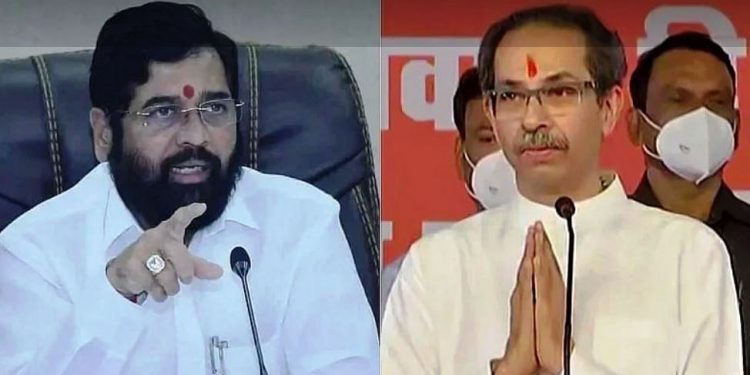New Delhi: The Supreme Court Monday sought responses from Chief Minister Eknath Shinde and other lawmakers of his group on a plea of the Uddhav Thackeray faction challenging Maharashtra Legislative Assembly Speaker Rahul Narwekar’s order declaring the Shiv Sena bloc led by Shinde as the “real political party” after its split in June 2022.
A bench comprising Chief Justice D Y Chandrachud and Justices JB Pardiwala and Manoj Misra took note of the submissions of senior advocates Kapil Sibal and Abhishek Singhvi, appearing for the Thackeray faction, and sought response of the chief minister and other MLAs within two weeks.
At the outset, the top court said the plea can be heard by the Bombay High Court as well. The senior lawyers for the Thackeray faction, however, opposed the idea and said the top court is more equipped to handle the case.
“Your Lordships have to decide it. If we go to the high court, then it will be delayed further,” Sibal said, adding the speaker’s decision had come in pursuance of the direction of the top court.
The Supreme Court, which initially intended to grant Shinde and the MLAs of his bloc four weeks to submit their replies, later fixed the case after two weeks.
The Thackeray faction, in its plea filed through MLA Sunil Prabhu, has alleged that Shinde “unconstitutionally usurped power” and is heading an “unconstitutional government”.
In his order passed January 10, Speaker Narwekar had also rejected the Thackeray faction’s plea to disqualify 16 MLAs of the ruling camp, including Shinde.
Challenging the orders passed by the Speaker, the Thackeray faction has claimed they are “patently unlawful and perverse” and that instead of punishing the act of defection, they reward the defectors by holding that they comprise the real political party.
“All impugned decisions are premised on a common finding that the majority of legislators represented the will of the political party, and therefore, they are not liable for disqualification,” the plea said.
This amounts to a complete inversion of the 10th Schedule, which is intended to disqualify legislators who act against their political party, it said.
“However, if the majority of legislators are treated to be the political party, then the members of the actual political party become subject to the will of the majority of legislators. This is totally against the Constitutional scheme, and is consequently liable to be set aside,” the petition said.
It said the speaker had erred in holding that the majority legislators of the Shiv Sena represented the will of the Shiv Sena political party.
“The balance of convenience is in favour of the petitioner and against the respondents. Eknath Shinde has unconstitutionally usurped power and is heading an unconstitutional Government in Maharashtra. This is extremely prejudicial and causing irreparable harm and injury to the petitioner, as well as to the general public,” the plea alleged.
As an interim relief, the petition has sought an ex-parte stay on the operation and effect of the January 10 order passed by the speaker, pending a decision on the plea before the apex court.
It has also sought interim relief restraining the Shinde faction from issuing directions to the group of Shiv Sena MLAs led by Thackeray.
“However, the impugned judgments are contrary to this salutary principle of Constitutional law, as they allow the evil of defection to be committed unabated, merely by winning over a majority of legislators belonging to the political party.
“In fact, rather than punishing the act of defection, the impugned judgments reward the defectors by holding that they comprise the political party,” it said.
The plea said it raises several substantial questions of law for consideration by the apex court.
“Whether the speaker failed to consider that the act of Eknath Shinde meeting the Governor, and taking oath as chief minister with the support of the BJP, and all the respondent MLAs supporting this decision, amounts to voluntarily giving up membership of the political party under Para 2(1)(a) of Tenth Schedule?” the petition asked.
In his ruling on the disqualification petitions, the speaker did not disqualify any MLA belonging to the rival camps.
The speaker’s ruling further cemented Shinde’s position as the chief minister, 18 months after he led a rebellion against Thackeray, and added to his political heft in the ruling coalition, which also consists of the BJP and the NCP (Ajit Pawar group), ahead of the Lok Sabha polls this summer and state assembly elections due in the second half of 2024.
Narwekar had said no party leadership can use provisions of the 10th Schedule of the Constitution (anti-defection law) to quell dissent or indiscipline within a party.
The Shinde group had the support of 37 out of the total 54 Sena MLAs when the party split in June 2022, the speaker had noted.
The Election Commission had given the ‘Shiv Sena’ name and ‘bow and arrow’ symbol to the Shinde-led faction in early 2023.
In his order on the disqualification petitions filed by the Shinde-led Sena and the rival Thackeray faction against each other’s MLAs, Narwekar had said Sunil Prabhu of the Sena (UBT) ceased to be the whip from June 21, 2022 (when the party split) and legislator Bharat Gogawale of the Shinde group became the authorised whip.
The speaker had also held that the Shiv Sena ‘pramukh’ (chief) did not have the power to remove any leader from the party. He did not accept the argument that the will of the party chief and the will of the party were synonymous.
PTI







































